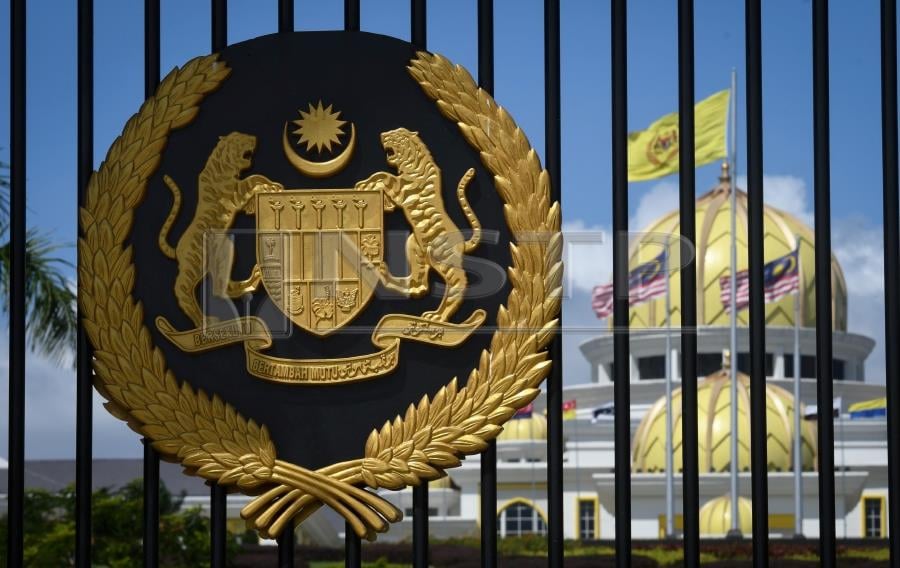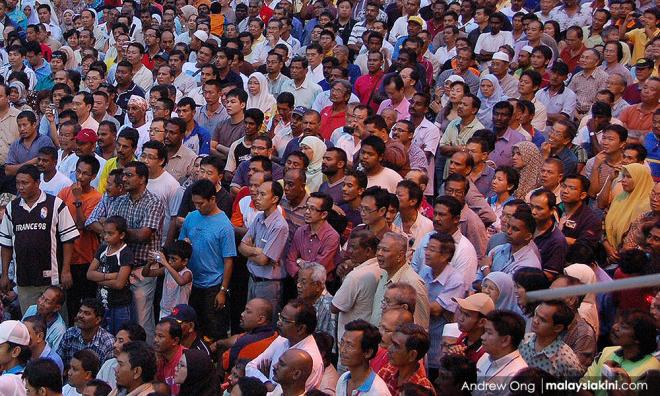
Published by Malay Mail, image from New Straits Times.
Malaysia’s parliamentary democracy remains alive. Yet, amidst the swirl of events between February 23 to February 29 2020, leading to Prime Minister Tan Sri Muhyiddin Yassin being named as the eighth Prime Minister of Malaysia, something is missing: The understanding of Malaysia as a Constitutional Monarchy (too).
Under such a system of Constitutional Monarchy, as and when the Prime Minister has resigned, or ostensibly lost the confidence of the Members of Parliament in the legislature formed of 222 of them, then the King, known in Malaysia as His Majesty Agong, would have to step in.
Thus Malaysia has a combination of two systems working in lock steps to ensure the interest of all the people in the country, in the event of an executive vacuum produced by a dead lock in the parliament, or in this case, the sudden resignation of former Prime Minister Tun Dr Mahathir Mohamed on February 24, before he was re-appointed by His Majesty Agong on that very same day as the “interim” or “care taker” Prime Minister.
While the word “interim” does not appear anywhere in the Malaysian Federal Constitution, there is a similar provision for “care taker” Prime Minister. Thus, while the government of Pakatan Harapan collapsed on February 24 with the resignation of the then Prime Minister Mahathir Mohamed, his subsequent role as the care taker Prime Minister allows, mutatis mutandis, the creation of the care taker government; where the latter would continue to function either based on candidates nominated by the political parties or chosen by the care taker Prime Minister himself until the impasse would be solved.
In light of the sudden and abrupt political uncertainties, that can lead to endless Game of Thrones to place one’s favourite candidate as the Prime Minister, His Majesty Agong had to act swiftly. Had this not manifested accordingly, to the powers provided to him by the Federal Constitution, he would have been accused of exposing Malaysia to the serious inter-mix of political and economic issues. Granted the looming Covid 19, which is still under control in Malaysia, His Majesty Agong understood the need to fill up the void produced by the absence of a Prime Minister. Why? The goal was to pre-empt the speed at which all things could unravel: either an economy bushwhacked by a lethal epidemology, or, a weak economy that makes it impossible for the health authorities in Malaysia to respond with alacrity.
Thus, it was all but necessary, to make a decision to permit the Prime Minister to be quickly appointed. On February 25-26, the palace of His Majesty Agong himself conducted an interview and poll of all 222 MPs. All these legislative members were asked three questions, which were revealed to the press.
One, would the MPs be supporting Mahathir, Anwar Ibrahim who then commands the biggest bloc of the votes in the parliament, or potentially, Muhyiddin, who too could marshal the votes, albeit based on a pastiche of various political parties, some of which were Malay nationalist while others Islamic ethno nationalist parties known as PAS.
Since a motley collection of political parties in Sarawak, known as GPS, had agreed to be “friendly” or become favorable to Prime Minister Muhyiddin Yassin, His Majesty Agong granted Muhyiddin the right to claim the role of the eighth Prime Minister of Malaysia, as per the provision provided to His Majesty Agong by the Federal Constitution.
There was no “Royal Coup” as claimed by The Guardian. Everything was executed based on the Federal Constitution. Indeed, the parliamentary speaker, had announced, under the advisement of Prime Minister Mahyuddin Yassin, to hold the next parliamentary session on May 18 2020, for a stretch of 15 days.
The misreading of Malaysia is understandable, by many analysts and observers local and abroad, when they failed to understand the country as a Constitutional Monarchy. Yet Malaysia is also a political regime based on the Whitehall system of government. Checks and balances remain the crucial edifice of the country, and continue to remain the case despite the demographic predominance of the Malays and Muslims in the country. There will not be a tyranny of the majority over the minority.
Dr. Rais Hussin is President & CEO of EMIR Research, an independent think tank focused on strategic policy recommendations based on rigorous research.
Diterbitkan oleh Sinar Harian.
DEMOKRASI Berparlimen di Malaysia masih kekal bernyawa, namun sewaktu peristiwa yang berlaku antara 23 Februari hingga 29 Februari lalu yang membawa kepada penamaan Tan Sri Muhyiddin Yassin sebagai Perdana Menteri Malaysia yang Kelapan, kelihatan semacam ada sesuatu yang gagal digarap dengan betul; pemahaman bahawa Malaysia juga adalah negara Raja Berperlembagaan.
Di bawah sistem Raja Berperlembagaan, ketika Perdana Menteri meletakkan jawatan atau kehilangan keyakinan ahli Parlimen dalam badan perundangan yang dibentuk 222 orang, maka raja dikenali di Malaysia sebagai Yang di-Pertuan Agong perlu campur tangan.
Oleh itu, Malaysia memiliki gabungan dua sistem yang berfungsi memastikan kepentingan semua rakyat di negara ini sekiranya berlaku kekosongan eksekutif yang terjadi hasil daripada kebuntuan di Parlimen atau dalam kes itu, peletakan jawatan secara mengejut oleh mantan Perdana Menteri, Tun Dr Mahathir Mohamad pada 24 Februari sebelum beliau dilantik semula oleh Yang di-Pertuan Agong pada hari yang sama sebagai Perdana Menteri Interim.
Ketika kerajaan Pakatan Harapan runtuh pada 24 Februari kerana peletakan jawatan Dr Mahathir dan ketika itu, peranannya sebagai Perdana Menteri Interim membolehkan terbentuknya kerajaan sementara yang terdiri daripada calon-calon yang dipilih oleh parti masing-masing atau Perdana Menteri sementara itu sendiri sehinggalah kebuntuan politik itu dihuraikan.
Memandangkan ketidakpastian politik itu berlaku secara mendadak yang boleh membawa kepada permainan takhta yang tidak berkesudahan dalam menetapkan calon kegemaran masing-masing sebagai Perdana Menteri, Yang di-Pertuan Agong terpaksa bertindak pantas.
Seandainya tidak bertindak pantas dan tegas sejajar dengan kuasa yang diperuntukkan dalam Perlembagaan Persekutuan, beliau akan dituduh mendedahkan Malaysia kepada cabaran serius politik dan ekonomi.
Matlamatnya adalah untuk mengelakkan ketidakpastian menjadi lebih buruk lagi dalam suasana negara menghadapi cabaran penyebaran wabak atau kelemahan ekonomi yang boleh menyukarkan pihak berkuasa kesihatan di Malaysia untuk bertindak balas dengan penuh fokus.
Lantaran itu, terdapat keperluan untuk melantik Perdana Menteri yang baharu dengan segera. Pada Februari 25-26, Yang di-Pertuan Agong sendiri telah mengendalikan wawancara dengan semua 222 ahli Parlimen. Semua ahli perundangan itu diajukan tiga soalan, seperti yang telah didedahkan kepada pihak akhbar.
Pertama, apakah ahli Parlimen akan menyokong Dr Mahathir atau Datuk Seri Anwar Ibrahim yang kemudiannya mempunyai blok terbesar undi di Parlimen atau secara potensinya Muhyiddin yang juga boleh memungut undi, walaupun daripada pelbagai parti politik, beberapa daripadanya adalah nasionalis Melayu manakala yang lainnya adalah daripada parti Pas.
Tiada rampasan kuasa diraja seperti yang didakwa akhbar Britain, The Guardian. Segala-galanya dilaksanakan berdasarkan Perlembagaan Persekutuan.
Malah, Yang di-Pertua Dewan Rakyat telah mengumumkan, di bawah nasihat Perdana Menteri, sidang parlimen akan datang berlangsung pada 18 Mei 2020 selama 15 hari.
Salah faham terhadap Malaysia dapat difahami ramai penganalisis dan pemerhati setempat dan luar negara apabila mereka gagal memahami negara yang mempunyai sistem Raja Berperlembagaan. Malaysia juga satu rejim politik berdasarkan sistem pemerintahan ‘Whitehall’.
Semak dan imbang tetap menjadi struktur penting negara dan keadaan itu akan terus kekal walaupun dengan dominasi demografi oleh orang Melayu dan umat Islam di negara ini.
Tidak akan ada kezaliman majoriti ke atas golongan minoriti.
Dr. Rais Hussin merupakan Presiden & CEO EMIR Research, sebuah organisasi pemikir bebas yang berfokuskan kepada pencernaan saranan-saranan dasar strategik berteraskan penyelidikan yang terperinci, konsisten dan menyeluruh.

